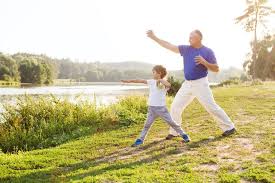Feel the physical, mental, and emotional benefits of the gentle flow moves of Tai Chi. Practiced by seniors with ease, also perfect for individuals with MS, standing or sitting. Therefore, the practice can be modified to meet individual needs. Either way, individuals will experience positive health benefits. Remember to work within your range of ability and not overdo it when starting a new exercise program. These exercises enhance balance, strength, immunity, and improved cognition and mobility; below is a list of 23 health-enhancing and preventive illness benefits.
Particularly popular with seniors because they don’t like it or cannot get up and down from the floor, so you can do everything standing, or from a chair it’s perfect. So, therefore, ideal for individuals with MS and other wheelchair conditions.
Tai Chi, Mind, Breath, & Body Connection: Meditation in Motion
In this low-impact, slow-motion exercise, you go without pausing through a series of motions, such as the “white crane spreads its wings” As you move, you breathe deeply and naturally, focusing your attention on your breath and sensations in the body. Tai chi is a low-impact exercise on the body for it is gentle. The movements are usually circular and never forced, the muscles are relaxed rather than tensed, the joints are not fully extended or bent, and connective tissue is not stretched to discomfort. All the moves forbid using strength, yet people who practice Tai Chi are surprised by the strength they gain.
Tai Chi Positive Health Enhancing and Preventive Benefits For Everyone
Studies at Harvard Medical School also state Tai Chi is more like “medication in motion.” There is growing evidence that this mind-body practice originated in China as a martial art and has value in treating or preventing many health problems. And you can get started even if you aren’t in top shape or the best health. Therefore, Tai Chi is also perfect for after-surgery recovery exercises.
- Relieves physical effects of stress
- Promotes deep breathing
- Reduces Mental stress and anxiety
- Helps with depression
- Improves lower body and leg strength
- Helps with arthritis and chronic pain
- Reduces blood pressure
- Requires mind and body integration through mental imagery
- Accumulates energy by releasing endorphins
- Enhances mental capacity and concentration
- Improves balance and stability by strengthening ankles and knees
- Chronic Obstructive Pulmonary Disease (COPD)
- Promotes faster recovery from strokes and heart attacks
- Improves conditions of Alzheimer’s, Multiple Sclerosis, and Parkinson’s
- Reduces bone loss in menopausal women
- It helps prevent low bone density
- Breast cancer and its side effects
- Helps prevent hypertension
- It helps prevent heart disease and failure
- Sleep problems, and
- Stroke
Stroke Rehabilitation:
Survivors of a stroke experience problems with balance, vision impairment, unbalance of inner-ear equilibrium, and physical weakness on one side of the body. Individuals with stroke endure seven times as many falls each year than healthy adults. The potential cause of fractures and decreased mobility could increase the fear of falling and result in social isolation or dependence. Tai chi is prosperous for individuals with stroke because they learn the skills to shift body weight throughout the lower half of the body as the upper body carries out separate actions. Therefore, allowing the individual to condition their body, becoming mindful of their movements. The individual utilizes a present mindset making tai chi so powerful. As a result, the individual becomes aware of the moment with a better sense of control. Therefore, tai chi can help individuals who have suffered a stroke in many ways to enhance their lives.
Healthy Internal Organs

Fluid turning and bending movements massage the internal organs. As a result, they release toxins and damaging constrictions by stress, poor posture, and harsh working conditions. On the other hand, they aid in exchanging gases in the lungs and help the digestive system work better.
Dementia
Individuals who learn Tai Chi find that they enjoy it. As a result, the enjoyment results in maintaining the practice while increasing their physically active lifestyle. Studies show the reduction of falls in older adults by enhancing strength and balance. Therefore, it sustains a good quality of life in an older individual with dementia. Improving brain health for the practice involves learning and remembering new movements and requires paying focused attention and multitasking. Tai chi could also enhance the brain’s efficiency and flexibility of neural connections.
Stress Management:
Mind-body mindfulness movements enhance relaxing focus during exercise routines. Tai chi takes you out of your worry and negative thinking, bringing the individual to the present moment where stress melts away—leaving you relaxed with a clear mind and more energy for the things you love to do.
Tai Chi Benefits for (COPD)
Chronic Obstructive Pulmonary Disease: The slow-flowing moves are a gentle exercise for individuals with COPD. Exercise is essential, and it may be hard for individuals to do many other practices, including walking any great distance. Gentle flow moves and breathing techniques improve oxygen intake, promoting higher oxygen levels throughout the body without unwanted activities that leave the individual breathless. Therefore, strengthening the body enables individuals to walk further with better pulmonary function after practicing for a short period than those who received usual care. By integrating the breath, mind, and physical activity, the individual achieves greater awareness and a sense of well-being.
Therefore, growing research builds a compelling case for health benefits for all who practice. As a result, supporting facts show it is a beneficial addition to standard medical treatment for the prevention and rehabilitation of many conditions—combined with primary medical treatment. Tai Chi addresses a disease or its primary symptoms, improving the patient’s function and quality of life.
Source:
Tai Chi Health www.taichihealth.com
An Introduction to Tai Chi Harvard Health Special Report
This gentle exercise can help maintain strength, flexibility, and balance and could be the perfect activity for the rest of your life. https://www.health.harvard.edu/staying-healthy/the-health-benefits-of-tai-chi
What is Tai Chi https://taichiforhealthinstitute.org/what-is-tai-chi/

